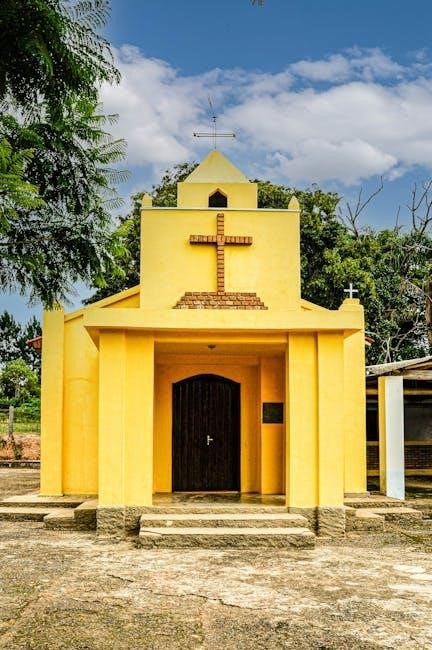
a small place pdf
Jamaica Kincaid’s A Small Place is a powerful critique of tourism and colonialism in Antigua, available in PDF and ePUB formats for digital readers worldwide.
Overview of the Memoir
A Small Place is a memoir by Jamaica Kincaid that blends personal narrative with socio-political critique. It explores the effects of tourism and colonialism on Antigua, reflecting on the island’s history, culture, and identity. Kincaid’s vivid prose examines the exploitation of Antigua’s resources and its people, while also delving into her own complex relationship with her homeland. The memoir is both a deeply personal reflection and a scathing critique of colonialism’s enduring legacy, offering a powerful perspective on post-colonial challenges in the Caribbean.
Historical and Cultural Context
A Small Place is deeply rooted in the historical and cultural fabric of Antigua, a Caribbean island shaped by colonialism and tourism. The memoir reflects on Antigua’s colonial past, the exploitation of its resources, and the lingering effects on its society. Kincaid critiques how colonialism eroded Antiguan identity and culture, while tourism perpetuates economic inequality. The text also explores the tension between Antigua’s rich cultural heritage and its post-colonial struggles, offering a vivid portrayal of life in a small Caribbean nation navigating its complex history.

Biography of Jamaica Kincaid
Jamaica Kincaid, born in St. John’s, Antigua, is a renowned author known for her vivid portrayals of Caribbean life. Her memoir, A Small Place, is available in PDF.
Early Life and Background
Jamaica Kincaid was born in 1949 in St. John’s, Antigua. Her early life shaped her writing, reflecting themes of colonialism and identity. She migrated to the U.S. as a teenager, attending school in New York. Her experiences in Antigua influenced her work, including A Small Place, which critiques tourism’s impact on her homeland. Available in PDF format, the memoir offers a personal and political exploration of her native island’s challenges and transformations.
Literary Career and Major Works
Jamaica Kincaid is a Jamaica-American writer known for her evocative prose and exploration of colonialism, identity, and culture. Her major works include At the Bottom of the River, Annie John, and A Small Place. The latter, a memoir, critically examines tourism and colonialism in Antigua. Kincaid’s writing often reflects her personal experiences and political perspectives. Her works are widely available in digital formats, including PDF, making her accessible to global readers interested in postcolonial studies and Caribbean literature.
Themes in “A Small Place”
Tourism and colonialism are central themes, as Kincaid critiques their impact on Antigua. The memoir explores exploitation, cultural erasure, and environmental degradation, offering a stark Caribbean reality.
The Impact of Tourism on Antigua
In A Small Place, Jamaica Kincaid critiques tourism’s role in Antigua, revealing economic disparities and cultural exploitation. She highlights how tourism perpetuates inequality, benefiting outsiders while locals struggle. The industry’s focus on luxury contrasts with the island’s poverty and environmental degradation. Kincaid argues that tourism distorts Antigua’s identity, turning it into a romanticized paradise that erases its colonial past and modern realities. Her analysis exposes the harsh truths behind the glossy facade of Caribbean tourism.
Colonialism and Its Legacy
Jamaica Kincaid examines the enduring effects of colonialism in Antigua, linking it to modern socio-economic issues. She argues that colonial exploitation laid the groundwork for ongoing inequality and cultural erasure. The memoir critiques how colonial powers imposed their narratives, suppressing Antiguan identity. Kincaid’s vivid portrayal reveals a legacy of systemic oppression, environmental degradation, and cultural alienation, emphasizing the need to reclaim history and challenge colonial myths. Her work underscores the long shadow of colonialism in shaping post-independence Antigua.

Reception and Criticism
Jamaica Kincaid’s A Small Place received mixed reactions for its blunt critique of colonialism and tourism. While praised for its unflinching honesty, it sparked controversy.
Academic and Literary Reviews
A Small Place has been widely studied in academic circles for its sharp critique of colonialism and tourism. Scholars praise its unflinching portrayal of Antigua’s post-colonial struggles, while others highlight its value in postcolonial studies. The memoir is often included in university curricula, sparking debates about exploitation and identity. Its inclusion in documentaries like Life and Debt further underscores its academic relevance. Despite mixed reviews, the work remains a significant contribution to Caribbean literature and critical theory.
Public Response and Controversies
A Small Place has sparked significant public debate due to its candid critique of tourism and colonialism. While some readers praise its raw honesty, others criticize its unflinching portrayal of Antigua’s struggles. The memoir’s inclusion in documentaries like Life and Debt has broadened its audience, fueling both admiration and controversy. Its unapologetic tone has led to mixed reactions, with some hailing it as a vital commentary on exploitation, while others find its approach overly harsh and divisive.

The Caribbean Context
A Small Place examines Antigua’s socio-economic struggles, highlighting colonialism’s lasting impact and tourism’s role in shaping the island’s identity within the broader Caribbean context.
Antigua and Its Post-Colonial Challenges
Antigua, like many Caribbean nations, grapples with the legacy of colonialism, evident in economic disparities and cultural identity crises. Jamaica Kincaid’s A Small Place highlights how tourism exploits Antigua’s resources, perpetuating inequality and environmental degradation. The memoir critiques the erasure of local history and the commodification of culture, offering a stark portrayal of post-colonial struggles. These challenges resonate across the Caribbean, where former colonies seek to redefine themselves amid globalized economies and lingering colonial influences.
Comparisons with Other Caribbean Nations
Jamaica Kincaid’s A Small Place mirrors the post-colonial struggles of other Caribbean nations, where tourism and colonial legacies leave lasting scars. Like Antigua, islands such as Jamaica and Barbados face similar issues of economic exploitation and cultural erasure. Kincaid’s critique resonates across the region, highlighting shared challenges in preserving cultural identity and achieving economic independence. These parallels underscore the broader impact of colonialism and globalization on small Caribbean states striving for self-determination and sustainable development.

Digital Availability and Formats
A Small Place is widely available in PDF and ePUB formats, accessible via online platforms like Perlego, enabling readers to download or read the memoir conveniently online.
PDF and ePUB Versions
A Small Place is readily available in PDF and ePUB formats, ensuring accessibility for modern readers. These digital versions can be downloaded from various online platforms, including Perlego, or read directly online. The PDF format preserves the original layout and typography, while the ePUB version offers flexibility for different devices. Both formats provide convenient access to Kincaid’s poignant critique of colonialism and tourism, making the memoir easily accessible for academic and personal reading worldwide.
Online Platforms and Access
A Small Place is accessible across multiple online platforms, including Perlego, which offers a subscription-based service for digital textbooks. Readers can also find the memoir on platforms like Labirinth, where ePUB and PDF versions are available for download or direct reading. Additionally, platforms such as Internet Archive provide free access to the text, enhancing its availability to a global audience. This ease of access ensures Kincaid’s critical work remains widely read and studied in both academic and casual settings.

Educational Use of the Memoir
A Small Place is widely used in academic curricula for its critical exploration of colonialism and tourism, offering valuable insights for anthropology and sociology studies, particularly in post-colonial contexts.
Incorporation into Academic Curricula
A Small Place is increasingly integrated into university syllabi due to its critical analysis of colonialism and tourism, offering students a nuanced perspective on post-colonial societies. Its exploration of Antigua’s socio-economic challenges resonates across disciplines, making it a valuable resource for courses in anthropology, sociology, and Caribbean studies. The memoir’s accessible yet profound narrative encourages students to engage with complex issues, fostering critical thinking and deeper understanding of global inequalities and cultural identity.
Analysis in Anthropology and Sociology Studies
Jamaica Kincaid’s A Small Place is a vital text in anthropology and sociology, offering a scathing critique of tourism and colonialism. Its exploration of power dynamics, cultural identity, and economic exploitation provides scholars with a lens to examine post-colonial societies. The memoir’s vivid portrayal of Antigua’s struggles resonates in studies of globalization, race, and inequality, making it a cornerstone for understanding the intersections of culture, history, and power in the Caribbean context.
Jamaica Kincaid’s A Small Place is a powerful critique of tourism and colonialism, revealing Antigua’s exploitation. Available in PDF, it offers accessible post-colonial insights globally.
Final Thoughts on the Memoir’s Significance
Jamaica Kincaid’s A Small Place remains a powerful critique of colonialism and tourism, offering a stark portrayal of Antigua’s exploitation. Its digital availability in PDF and ePUB formats ensures accessibility for modern readers. The memoir’s unflinching honesty and intimate voice make it a vital work for understanding post-colonial struggles. Kincaid’s exploration of identity, culture, and economic disparity continues to resonate, making A Small Place a cornerstone of Caribbean literature and a necessary read for global audiences.
Related posts:
Archives
- February 2026
- January 2026
- December 2025
- November 2025
- October 2025
- September 2025
- August 2025
- July 2025
- June 2025
- May 2025
- April 2025
- March 2025
- February 2025
- January 2025
- December 2024
- November 2024
- October 2024
- September 2024
- August 2024
- July 2024
- June 2024
- May 2024
- April 2024
- March 2024
- February 2024
- January 2024
- December 2023
- November 2023
- October 2023
- September 2023
- August 2023
- July 2023
- June 2023
- May 2023
Calendar
| M | T | W | T | F | S | S |
|---|---|---|---|---|---|---|
| 1 | ||||||
| 2 | 3 | 4 | 5 | 6 | 7 | 8 |
| 9 | 10 | 11 | 12 | 13 | 14 | 15 |
| 16 | 17 | 18 | 19 | 20 | 21 | 22 |
| 23 | 24 | 25 | 26 | 27 | 28 | 29 |
| 30 | 31 | |||||
Leave a Reply
You must be logged in to post a comment.